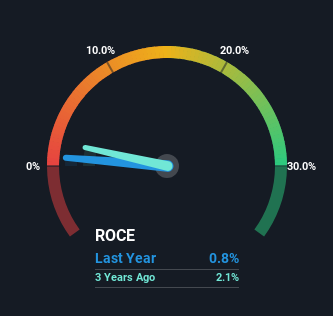- Hong Kong
- /
- Gas Utilities
- /
- SEHK:392
Beijing Enterprises Holdings (HKG:392) Has Some Difficulty Using Its Capital Effectively

When researching a stock for investment, what can tell us that the company is in decline? A business that's potentially in decline often shows two trends, a return on capital employed (ROCE) that's declining, and a base of capital employed that's also declining. This indicates to us that the business is not only shrinking the size of its net assets, but its returns are falling as well. And from a first read, things don't look too good at Beijing Enterprises Holdings (HKG:392), so let's see why.
Return On Capital Employed (ROCE): What Is It?
For those that aren't sure what ROCE is, it measures the amount of pre-tax profits a company can generate from the capital employed in its business. Analysts use this formula to calculate it for Beijing Enterprises Holdings:
Return on Capital Employed = Earnings Before Interest and Tax (EBIT) ÷ (Total Assets - Current Liabilities)
0.0077 = CN¥1.1b ÷ (CN¥216b - CN¥70b) (Based on the trailing twelve months to June 2024).
So, Beijing Enterprises Holdings has an ROCE of 0.8%. In absolute terms, that's a low return and it also under-performs the Gas Utilities industry average of 8.6%.
See our latest analysis for Beijing Enterprises Holdings

In the above chart we have measured Beijing Enterprises Holdings' prior ROCE against its prior performance, but the future is arguably more important. If you're interested, you can view the analysts predictions in our free analyst report for Beijing Enterprises Holdings .
So How Is Beijing Enterprises Holdings' ROCE Trending?
We are a bit worried about the trend of returns on capital at Beijing Enterprises Holdings. Unfortunately the returns on capital have diminished from the 2.3% that they were earning five years ago. On top of that, it's worth noting that the amount of capital employed within the business has remained relatively steady. Since returns are falling and the business has the same amount of assets employed, this can suggest it's a mature business that hasn't had much growth in the last five years. So because these trends aren't typically conducive to creating a multi-bagger, we wouldn't hold our breath on Beijing Enterprises Holdings becoming one if things continue as they have.
On a side note, Beijing Enterprises Holdings' current liabilities have increased over the last five years to 32% of total assets, effectively distorting the ROCE to some degree. Without this increase, it's likely that ROCE would be even lower than 0.8%. Keep an eye on this ratio, because the business could encounter some new risks if this metric gets too high.
What We Can Learn From Beijing Enterprises Holdings' ROCE
All in all, the lower returns from the same amount of capital employed aren't exactly signs of a compounding machine. And, the stock has remained flat over the last five years, so investors don't seem too impressed either. With underlying trends that aren't great in these areas, we'd consider looking elsewhere.
If you'd like to know more about Beijing Enterprises Holdings, we've spotted 2 warning signs, and 1 of them shouldn't be ignored.
While Beijing Enterprises Holdings may not currently earn the highest returns, we've compiled a list of companies that currently earn more than 25% return on equity. Check out this free list here.
Valuation is complex, but we're here to simplify it.
Discover if Beijing Enterprises Holdings might be undervalued or overvalued with our detailed analysis, featuring fair value estimates, potential risks, dividends, insider trades, and its financial condition.
Access Free AnalysisHave feedback on this article? Concerned about the content? Get in touch with us directly. Alternatively, email editorial-team (at) simplywallst.com.
This article by Simply Wall St is general in nature. We provide commentary based on historical data and analyst forecasts only using an unbiased methodology and our articles are not intended to be financial advice. It does not constitute a recommendation to buy or sell any stock, and does not take account of your objectives, or your financial situation. We aim to bring you long-term focused analysis driven by fundamental data. Note that our analysis may not factor in the latest price-sensitive company announcements or qualitative material. Simply Wall St has no position in any stocks mentioned.
About SEHK:392
Beijing Enterprises Holdings
An investment holding company, engages in the gas, water, environmental, brewery, and other businesses in Mainland China, Germany, and internationally.
Undervalued second-rate dividend payer.


